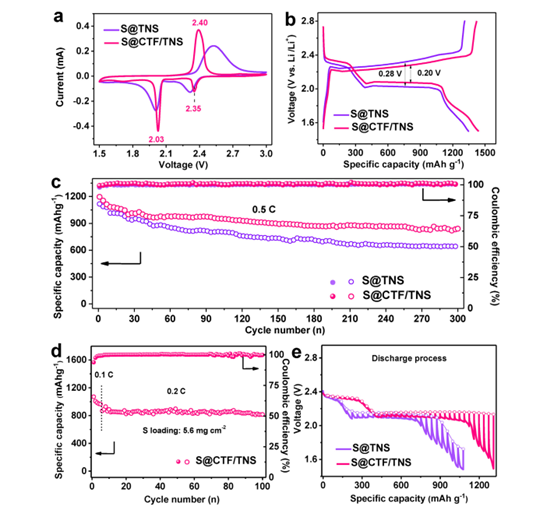已传文件:photo/1631586161.png

Research Background
Lithium-sulfur (Li-S) batteries are considered to be a promising alternative to lithium-ion batteries due to their high theoretical specific capacity (1675 mA h g−1), low cost, and low pollution. However, the "shuttle effect" caused by the dissolution and diffusion of intermediate lithium polysulfide (LiPSs), coupled with poor electronic conduction and ion diffusion kinetics, often leads to rapid capacity degradation. On the other hand, the high sulfur content of the high sulfur cathode is also a key factor in the practical application of lithium batteries. Therefore, in order to solve the above problems, the current focus of work is mainly to develop suitable sulfur matrix materials that can inhibit the shuttle effect, promote electrical conductivity/ionic conductivity and high sulfur content.
Introduction
Recently, the research group of Professor Yang Jinhu of Tongji University published a research paper titled Two-dimensional organic-inorganic heterostructures of insitu-grown layered COF on Ti3C2 MXene nanosheets for lithium-sulfur batteries in the well-known academic journal Nano Today.
Graphic guide

Figure 1. Schematic diagram of the synthesis process of two-dimensional CTF/TNS heterostructure and S@CTF/TNS composite.
Figure 2. SEM, TEM, XRD and BET specific surface area test.
Figure 3. Schematic diagram of XANES spectrum and differential charge.
Figure 4. Performance test of S@CTF/TNS composite lithium-sulfur battery.
Figure 5. Simulation analysis of LiPSs adsorption by CTF/TNS heterostructure.
Summary of this article
In this paper, a two-dimensional organic-inorganic heterostructure of multi-layer CTF nanosheets with covalent interfacial interactions was synthesized and studied as a sulfur matrix material for lithium batteries. The lithium battery based on CTF/TNS heterostructure effectively inhibits the shuttle effect due to complementary adsorption, the reaction kinetics and reversibility are improved, and the overall performance is superior.
Literature link:
https://doi.org/10.1016/j.nantod.2020.100991
This information is sourced from the Internet for academic exchanges only. If there is any infringement, please contact us to delete it immediately.









